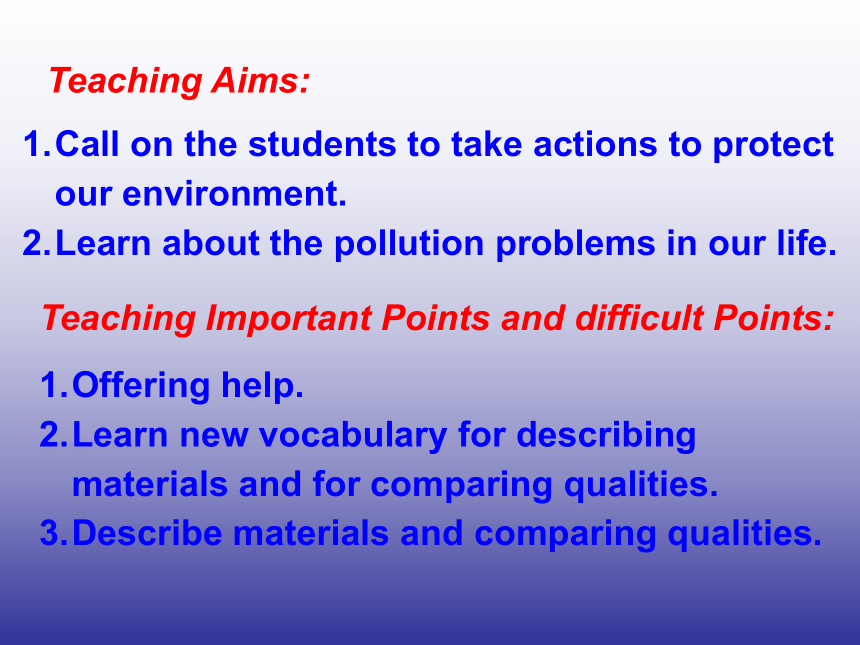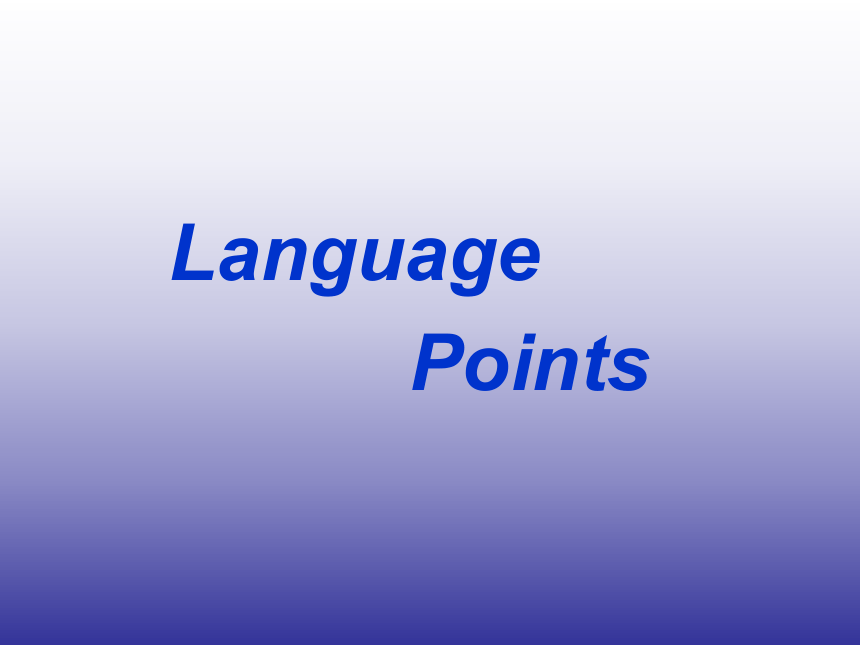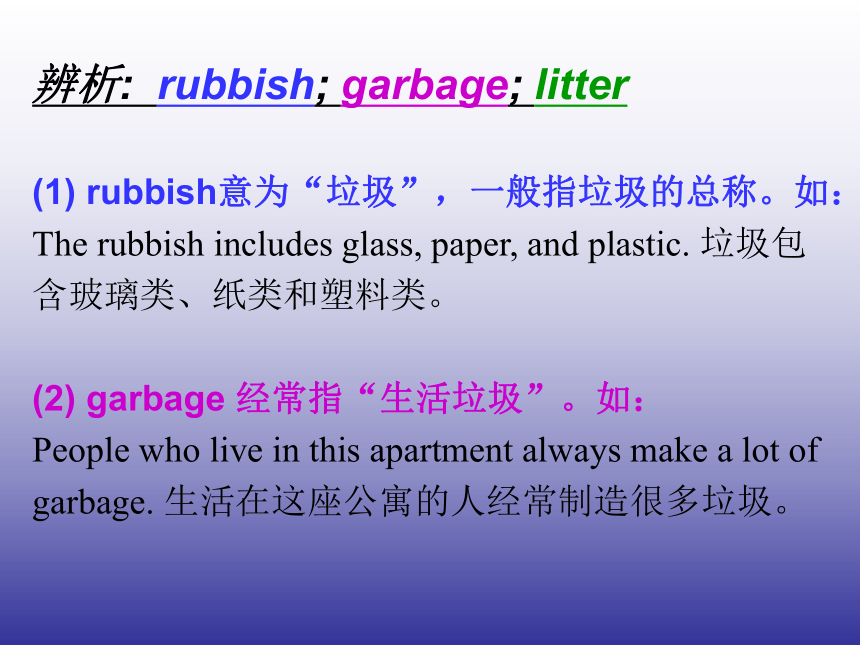英语八年级下冀教版 Unit 8 Lesson 47 课件(共10张PPT)
文档属性
| 名称 | 英语八年级下冀教版 Unit 8 Lesson 47 课件(共10张PPT) |

|
|
| 格式 | ppt | ||
| 文件大小 | 501.0KB | ||
| 资源类型 | 教案 | ||
| 版本资源 | 冀教版 | ||
| 科目 | 英语 | ||
| 更新时间 | 2022-01-28 00:00:00 | ||
图片预览





文档简介
(共10张PPT)
Lesson 47:
Connected to Nature
Teaching Aims:
Teaching Important Points and difficult Points:
Call on the students to take actions to protect our environment.
Learn about the pollution problems in our life.
Offering help.
Learn new vocabulary for describing materials and for comparing qualities.
Describe materials and comparing qualities.
bee ant
dove die
dead species
respect
New Words
Language
Points
辨析: rubbish; garbage; litter
(1) rubbish意为“垃圾”,一般指垃圾的总称。如:
The rubbish includes glass, paper, and plastic. 垃圾包含玻璃类、纸类和塑料类。
(2) garbage 经常指“生活垃圾”。如:
People who live in this apartment always make a lot of garbage. 生活在这座公寓的人经常制造很多垃圾。
(3) litter意为“到处乱丢的零星杂物”,比如公园或者电影院地上的那些零星杂物或皮、纸屑等。如:
We should not throw any litter when we take a bus. 当我们乘坐公交车时我们不应该乱扔垃圾。
Exercises
I. 根据句意及汉语提示,完成单词。
1. The _________ (包装) of the present is very beautiful.
2. Shall we have a _______ (野餐) next Sunday
3. I can help you ________ (分类) different
kinds of garbage.
4. The box is made of _______ (金属) and it is very heavy.
5. China has put a ban (禁令) on shops giving away _______ (塑料) bags from June 1st, 2008.
plastic
packaging
picnic
sort
metal
II. 用所给单词的适当形式填空。
1. The ______ (weigh) of the box is two kilos.
2. He ______ (put) the newspaper here yesterday.
3. ___________ (not throw) your clothes on the floor!
4. The tickets were ______ (much) expensive than I thought.
5. Thanks for ______ (pick) up my pencil-box.
picking
weight
put
Don't throw
more
III. 根据汉语提示翻译下列句子,每空一词。
1. 凯特已经把两包课本倒在书桌上。
Kate ______ ________ two bags of books ______ the desk.
2. 在我们教室,每个人每天都会制造垃圾。
In our classroom, everyone ______ _______ every day.
3. 我和她的年龄一样大。
I am ______ ______ age ______ her.
4. 让我们晚饭后去散步吧!
Let's ______ ______ ______ after supper!
take a walk
has emptied
on
makes garbage
the same as
Lesson 47:
Connected to Nature
Teaching Aims:
Teaching Important Points and difficult Points:
Call on the students to take actions to protect our environment.
Learn about the pollution problems in our life.
Offering help.
Learn new vocabulary for describing materials and for comparing qualities.
Describe materials and comparing qualities.
bee ant
dove die
dead species
respect
New Words
Language
Points
辨析: rubbish; garbage; litter
(1) rubbish意为“垃圾”,一般指垃圾的总称。如:
The rubbish includes glass, paper, and plastic. 垃圾包含玻璃类、纸类和塑料类。
(2) garbage 经常指“生活垃圾”。如:
People who live in this apartment always make a lot of garbage. 生活在这座公寓的人经常制造很多垃圾。
(3) litter意为“到处乱丢的零星杂物”,比如公园或者电影院地上的那些零星杂物或皮、纸屑等。如:
We should not throw any litter when we take a bus. 当我们乘坐公交车时我们不应该乱扔垃圾。
Exercises
I. 根据句意及汉语提示,完成单词。
1. The _________ (包装) of the present is very beautiful.
2. Shall we have a _______ (野餐) next Sunday
3. I can help you ________ (分类) different
kinds of garbage.
4. The box is made of _______ (金属) and it is very heavy.
5. China has put a ban (禁令) on shops giving away _______ (塑料) bags from June 1st, 2008.
plastic
packaging
picnic
sort
metal
II. 用所给单词的适当形式填空。
1. The ______ (weigh) of the box is two kilos.
2. He ______ (put) the newspaper here yesterday.
3. ___________ (not throw) your clothes on the floor!
4. The tickets were ______ (much) expensive than I thought.
5. Thanks for ______ (pick) up my pencil-box.
picking
weight
put
Don't throw
more
III. 根据汉语提示翻译下列句子,每空一词。
1. 凯特已经把两包课本倒在书桌上。
Kate ______ ________ two bags of books ______ the desk.
2. 在我们教室,每个人每天都会制造垃圾。
In our classroom, everyone ______ _______ every day.
3. 我和她的年龄一样大。
I am ______ ______ age ______ her.
4. 让我们晚饭后去散步吧!
Let's ______ ______ ______ after supper!
take a walk
has emptied
on
makes garbage
the same as
同课章节目录
- Unit 1 Spring Is Coming
- Lesson 1 How's the weather?
- Lesson 2 It's Getting Warmer!
- Lesson 3 Sun Is Rising
- Lesson 4 The Spring City
- Lesson 5 Babysitting on a Spring Day
- Lesson 6 Stories about Spring
- Unit 2 Plant a Plant
- Lesson 7 Planting Trees
- Lesson 8 Why Are Plants Important?
- Lesson 9 Gardening with Mary
- Lesson 10 Make Your Garden Grow!
- Lesson 11 Amazing Plants
- Lesson 12 Danny's Plant
- Unit 3 Animals Are Our Friends
- Lesson 13 Danny's Big Scare
- Lesson 14 Amazing Animals
- Lesson 15 The Zoo Is Open
- Lesson 16 The Pear Escaped
- Lesson 17 Save the Tigers
- Lesson 18 Friendship Between Animals
- Unit 4 The Internet Connects Us
- Lesson 19 How Do You Use the Internet?
- Lesson 20 A Computer Helps!
- Lesson 21 Books or Computers?
- Lesson 22 Travel on the Internet
- Lesson 23 The Internet--Good or Bad?
- Lesson 24 An E-mail to Grandpa
- Unit 5 Buying and Selling
- Lesson 25 Raising Money
- Lesson 26 Cookies, Please!
- Lesson 27 Business English
- Lesson 28 Ms. Liu's Great Idea
- Lesson 29 How to Push a Product
- Lesson 30 A Cookie Sale
- Unit 6 Be a Champion!
- Lesson 31 Don't Fall, Danny
- Lesson 32 My Favourite Record
- Lesson 33 2800 Years of Sports
- Lesson 34 Modern Olympics
- Lesson 35 The Dream Team
- Lesson 36 Classroom Olympics
- Unit 7 Know Our World
- Lesson 37 Let's Learn Geography!
- Lesson 38 The World Is a Big Place
- Lesson 39 Ring Up or Call?
- Lesson 40 Body Language
- Lesson 41 A Class of the World
- Lesson 42 North America
- Unit 8 Save Our World
- Lesson 43 Let's Clean Up!
- Lesson 44 Environment Clubs
- Lesson 45 Let's Sort Garbage!
- Lesson 46 Protect Our Environment
- Lesson 47 Connected to Nature
- Lesson 48 Garbage Is Interesting!
